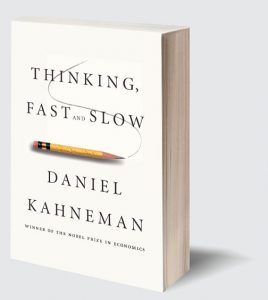Putting the Brakes on Fast Thinking with the MBTI®

After reading Daniel Kahneman’s latest book, “Thinking, Fast and Slow”, I saw how clearly his work regarding fast thinking and slow thinking aligns with personality typing based on the Myers-Briggs Type Indicator® (MBTI®). As a dietitian and practitioner of the MBTI®, I’ve always wanted people to learn about their type and understand its influence on their actions and on their decision-making.
Being on Autopilot (aka “fast thinking”)
Let’s face it. Everything we do is based on a decision. It can be as simple as deciding whether to press the snooze button on your alarm clock and catch another 15 minutes of sleep or turning it off and going for that morning walk or jog you promised yourself the night before. How often do you push the snooze button? Has it become an action that’s on autopilot at this point?
And that’s the problem — being on autopilot. Daniel Kahneman is an Israeli psychologist and Nobel Prize winner who said in his book, “Thinking, Fast and Slow” that autopilot can be our undoing. Autopilot is fast thinking on steroids. I’m not even sure you can call is thinking at all.
Who wouldn’t admit that there are habits they have that come from being on autopilot? Nothing to be ashamed of. In fact, with all that we have to do in a day’s time, thank goodness some things are on autopilot. Do you brush your teeth every night before going to bed? Okay, there you have one good habit on autopilot. Do you have dessert every night with dinner? Now you’ve got an autopilot habit that may be leading to weight issues. In other words, when living on autopilot, little to no thinking takes place. Big mistake if the outcome is bad health.
How to Fix the Fast Thinking Problem
This may sound really obvious, but slow your thinking down. And in that process of slowing your thinking down, you get an opportunity to actually think and make a decision rather than just act. How you make that decision is the basis for leading a healthy life. That’s where personality typing comes in.
The Myers-Briggs Type Indicator® tells us that there are four very important personality preferences involved in our actions — two that make up how and what information we gather and two that help with the decision-making process itself. The first two preferences are Sensing and iNtuiting. The latter two are Thinking and Feeling.
Sensing gives us the details of the situation, history of things that are similar, what’s happening right now. Compare that to iNtuiting that tells us what might happen in the future, what might be the consequences of doing one thing or another. Thinking allows us to consider logically and analytically what are the benefits to taking one action or another. Feeling looks at the decision differently — more along the lines of how it’s going to make me feel or how it’s going to affect others.
Understand Who You Are
Understand that there is much more to these preferences, but a short blog like this can only share the highlights. Consider getting my latest book, “Health Hijackers” where you can take the personality quiz and see for yourself how your type influences who you are. The book also shows you the best method to making those healthy decisions using what I call the Zig-Zag Solution™. Learn how to take control of your life back from the health hijackers.
 What we naturally and normally do doesn’t look anything like the Zig-Zag Solution™. With some of the 16 personality types, the decision is made and then maybe some backup information is found to justify the decision. Then there are some types that are better at first looking at the information and then making a decision. However, no type actually considers all the pertinent information — past, present, and future — and no type decides both rationally and emotionally. That’s because no personality type reflects Sensing, iNtuiting, Thinking, and Feeling. We do tend to favor either Sensing or iNtuiting, Thinking or Feeling. And that could be the problem.
What we naturally and normally do doesn’t look anything like the Zig-Zag Solution™. With some of the 16 personality types, the decision is made and then maybe some backup information is found to justify the decision. Then there are some types that are better at first looking at the information and then making a decision. However, no type actually considers all the pertinent information — past, present, and future — and no type decides both rationally and emotionally. That’s because no personality type reflects Sensing, iNtuiting, Thinking, and Feeling. We do tend to favor either Sensing or iNtuiting, Thinking or Feeling. And that could be the problem.
First, if you don’t know what your type name is, take the free personality quiz on this site. Then check out this infographic to give you an idea of some of the basics of the Zig-Zag Solution™. Better yet, get the book, “Health Hijackers” to better understand who you are and how to make the healthiest decisions.

